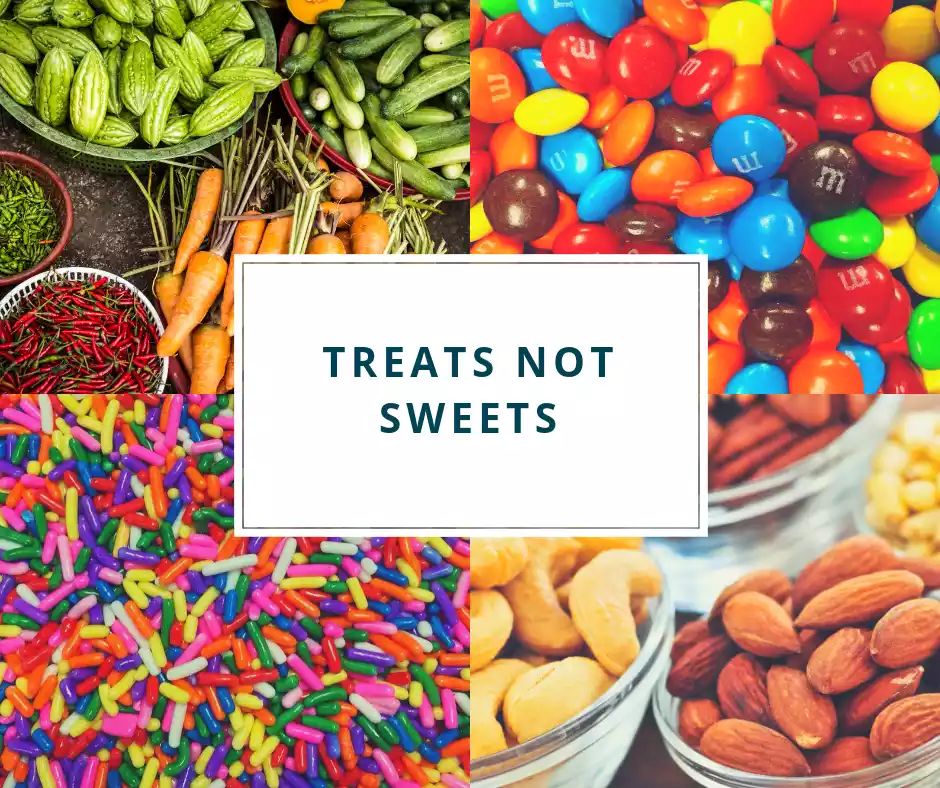
Treats not Sweets
The holidays are upon us. That means cooler weather and tasty sweets. I associate Halloween, Thanksgiving, Christmas, and even Valentines Day with lots of tasty, sweet foods, like pecan pie, fudge, sugar cookies, and M&M’s. Except for the effects this has on my waistline, I love this time of year.
Recently, I Google searched “sugar” on the Internet. Dozens of articles on the addictive qualities of sugar popped up on my screen. That is a scary thought – sugar, a household staple, is associated with cocaine and methamphetamine. Neuroscience has revealed that sugar activates the brain’s reward center similarly to illegal drugs. They both stimulate the nucleus accumbens and release dopamine (i.e. neurotransmitter that is associated with pleasure) into the brain’s mesolimbic pathway. The stimulation of the mesolimbic pathway motivates the body to unconsciously seek out more pleasurable experiences or substances, including sweets.
In addition to neuroscience, Nutritional psychology (an emerging study that examines how nutrition impacts psychological well-being) provides another explanation for why we crave sugars. In general, the body separates foods into three categories: carbohydrates, fats, and proteins. Carbohydrates are our body’s primary source of energy. Carbohydrates are separated into two groups: complex carbs and simple carbs. Complex carbs are made up of fiber, starch, and sugar; whereas, simple carbs are only made up of sugar.
As a whole, the Standard American Diet (SAD) consumes too many simple carbs (e.g., cereals, fast foods, and sweet snacks). Simple carbs spike the body’s blood sugar levels. When the body’s blood sugar is elevated, the pancreas releases insulin, which moves the sugars out of the blood and into the cells (i.e., stores energy and becomes fat). The body tends to overcorrect itself when it consumes sugary food. The overcorrection results in a drastic dip in the body’s blood sugar levels, which leaves us feeling lethargic and edgy. At this point, two things can happen to increase energy levels: 1) in an attempt to reenergize itself the body releases cortisol, a stress hormone, and 2) we crave more sugary foods. This overcorrection results in: mindlessly buying candy from the vending machine, inadvertently ordering French fries in the drive through line, or “accidently” reaching for the crackers in the pantry. It is easy to see how the body can unconsciously fall into a never-ending cycle that seeks tasty sweets and adds inches to our waistline.
There are several ways to stop craving sugar:
1) One option is to eat complex carbohydrates, such as fruits and vegetables. Unlike the sugars that are found in drinks, candy, and bread, the sugars that are found in fruits and vegetables have more nutritional value. Fruits and vegetables are filled with fiber, which actually slows down the stimulating process of sugars in the body. Berries are my personal favorite snack. They have less sugar, are filled with fiber, and have a ton of antioxidants, i.e., rid the body of free radicals that speed up the aging process and have been linked to cancers. When my kids were small they were allowed to eat from the fruit drawer whenever they wanted a snack, they did not have to ask for permission.
2) Fats and proteins are filing. Reduce your pasta and bread consumption by allowing meats and vegetables to be your primary meal. Additionally, a handful of walnuts or almonds are a great snack. The fats and proteins that are found in nuts are filling and have a ton of nutritional value.
3) We often reach for sugary foods when we are tired in hopes of increasing our energy levels. A healthy alternative to using sweets to keep you awake is to get plenty of sleep at night. Sleeping a full 8 hours a night has been found to be a helpful weight loss strategy.
4) Speaking of weight loss, exercise has been found to help increase energy levels and regulate the caloric process. With your doctor’s okay, exercise for at least thirty minutes 3-5 times/week.
5) Most Americans do not drink enough water. Dehydration can lead to a sweet tooth. Instead of drinking sugary drinks try drinking water when you are thirsty. Plus, you are less likely to eat a big slice of pecan pie if you drink 32 ounces of water.
This holiday season put down the “addictive” sweets and treat yourself to a healthy alternative: eat fruit or veggie snacks, snack on nuts when you have a craving, strive to obtain 8 hours of sleep a night, engage in routine exercise, and drink plenty of water. These five treats can help you feel better.


